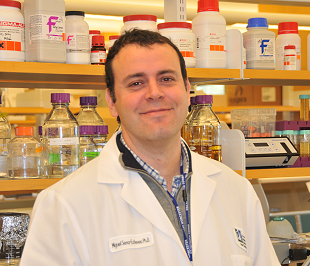 Miguel Sena-Esteves, PhD |
Miguel Sena-Esteves, PhD, associate professor of neurology, received the 2011 Outstanding New Investigator Award from the American Society of Gene & Cell Therapy (ASGCT) for his many contributions to the field of gene and cell therapy. A member of the Gene Therapy Center, Dr. Sena-Esteves is investigating the potential of using novel gene therapy techniques to replace the faulty gene that causes Tay-Sachs disease, a devastating neurological disorder.
“It’s rare for an investigator at this stage of his career to have accomplished what Miguel has,” said Guangping Gao, PhD, the Penelope Booth Rockwell Chair in Biomedical Research, professor of molecular genetics & microbiology and director of the Gene Therapy Center. “This award recognizes the novel insights Miguel has contributed to the field of gene therapy and is a reflection of what a rising young star he is.”
The largest association of individuals involved in genetic and cellular therapeutics with nearly 2,000 members worldwide, ASGCT was founded in 1996 and is dedicated to the understanding, development and application of genetic and cellular therapies. Since 2002, the ASGCT has awarded the Outstanding News Investigator Award to active members of the society who are independent investigators conducting original research in basic science, technology development and/or clinical translation in the field of gene and/or cell therapy.
Sena-Esteves joined UMass Medical School in 2009 and was a leading force behind the creation of the Tay-Sachs Gene Therapy Consortium, an international collaboration of scientists committed to translating current gene therapy results into a human clinical trial within the next three years.
Tay-Sachs disease causes deterioration of mental and physical abilities starting at six months of age and usually results in death by the age of five. It is one of 40 rare, inherited metabolic disorders called lysosomal storage diseases that result from a breakdown in a cell’s ability to remove or recycle waste products due to a missing enzyme. The gradual build up of waste inside the cell eventually results in cell death and causes the slow breakdown of motor and neurological function in patients.
Sena-Esteves and his colleagues at the Tay-Sachs Gene Therapy Consortium are using a gene therapy to replace the faulty gene that produces the enzyme responsible for removing and recycling waste products in cells. Once introduced into brain, the functioning gene begins making the missing enzyme, turning parts of the brain into mini-factories. Capitalizing on the natural pathways of the brain, those enzymes are then distributed throughout the brain, allowing cells to resume their natural metabolic functions and remove waste products.
The Gene Therapy Center is part of the Advanced Therapeutics Cluster at UMMS and is performing translational research into cystic fibrosis, alpha-1 antitrypsin deficiency, lysosomal storage diseases, Canavan disease, retinal and macular degeneration and other genetic diseases.